
|
| The
following is an excerpt from a chapter of a forthcoming book by John Rook
...
KQV Is Groovy QV Racing the motor on my 1958 Mercury to prepare for heating up the car, the cool air in Denver wasn't the only chill I would receive as I turned on the radio to become aware of what the entire world was hearing on that day ... November 22, 1963. No, it wasn't possible I thought ... President Kennedy had been shot while visiting Dallas, Texas. I rushed back inside the house, turned on the TV and telephoned KTLN to find out just what my schedule would be ... every radio station, including mine, had discontinued regular programming to cover the biggest news of more than a decade. No, I wouldn't be needed said newsman Tom Griffiths as he explained KTLN's Program Director, Joe Finan was on the air offering his accounting of the shooting, with network sources offering in depth coverage. There would be no need for a rock n' roll disc jockey this day. It was the beginning of being glued to the TV for most of a week, so much happened, very little sleep was possible. With the President announced as dead, LBJ was sworn in with Jacque Kennedy at his side on the same plane that would transport the remains of John F. Kennedy back to Washington, D.C. where his brother Bobby Kennedy would be on hand to comfort his sister in law and together as they accompanied the casket that would begin its journey to Arlington National Cemetery. The somber parade of world leaders, the salute to his father by little John Kennedy, the riderless horse with empty boots in the stirrups, the flag draped coffin of our slain President, there wasn't a dry eye in the entire nation as the mourning process began. Then within days of Kennedy's murder, live TV provided another horror as the person charged with the President's murder was himself shot dead while being led by Dallas lawmen. It was perhaps the first time that television invaded our tranquil world, poking its eye into a planet that would never again be the same. Needless to say not much thanks was given to Thanksgiving with Christmas and New Years not allowing the customary joy either. Just a few months before the Kennedy assassination, the programming at my station was beginning to change as Joe Finan had persuaded KTLN's owner, Richard Wheeler, a move to talk radio would better serve the market than being one of five top thirty radio stations. So in the days before Top 40 was born, KTLN would become KTaLK, Denver's first real adventure into talk radio. A similar format had already begun to show some success in Los Angeles with Joe Pyne on KLAC and Ben Hoberman's KABC. But, just out of my teenage years and a devotee of the new rock n' roll music, I had little interest in becoming a talk show host and was excited when Denver's top rated KIMN had offered me the program director's position there. Ken Palmer, the stations owner, suggested I come aboard as an on-air personality, taking time to learn the ropes as music director and "within six month's I'll name you Program Director". I had all but accepted the job when I learned my contract with KTLN prevented me from working for any competing radio station within six months of my departure there. Then just before Christmas, being told by Joe Finan that my "position was being eliminated" I wasn't free to begin working for KIMN and with no nest egg, I had no idea how I would exist until Ted Atkins, program director of KDAB offered me an on-air position. Finan didn't consider the Arvada, Colorado station, a daytimer to be competition and released me to begin working there. Ken Palmer advised I should not make any long term commitment because of a conversation he had "with a friend in the east who is interested in you for a top ten market". Ken didn't indicate where or for whom I may be working, but did say "your luck is about to change John". 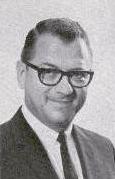
John D. Gibbs Within just a few days of Christmas, John D. Gibbs would enter my life to indeed change my luck. Telephoning me at home, he simply asked if I would be interested in a job as program director in Pittsburgh. At this stage, he not only didn't mention the call letters, but he also didn't tell me his name. "I sure would sir", I replied as he added, "you'll be traveling here at your own expense if that's ok". "Of course" I said, giving no thought to how I would do it as he ended the conversation telling me his secretary would be in touch to provide me with more details. Within a few days, I was traveling via jet, for the first time ... on my way to Pittsburgh. Borrowing the money from a friend to cover my airfare and only the word of a total stranger that reservations would be awaiting me at the William Penn hotel in Pittsburgh I hoped I had enough to cover the taxi ride from the airport. Arriving at the hotel and proceeding to the front desk, I was handed a large envelope before being escorted to my room comp-lete with radio but no TV. My suitcase didn't contain much, just a sports jacket, two or three trousers and a shirt or two. The wages of a rock n' roll disc jockey in those days, especially from Denver, didn't allow for much of a wardrobe. Hanging my possessions in the closet and turning my attention to the envelope, I found two large yellow lined legal pads, three or four pencils and the clipping from the Pittsburgh Press giving the call letters and dial positions of the cities radio stations. One single note on a plain sheet of paper advised me to spend some time listening to the market's radio stations ... perhaps two days it indicated ... and be ready to give my impressions upon next being contacted. Still no name, no radio station was given, but I was advised I could "use room service within reason" to supply my need of food. Into the early morning hours, I eagerly went about monitoring each radio station, making notes as I went. With just a few hours of sleep, I began the process again at dawn on my second and third day in that hotel room. Reams of notes filled the pages as I found Pittsburgh radio much less exciting than that of Denver, Los Angeles, Dallas, or most western markets. Finally on my third day, the man of mystery telephoned, "I'll be right over, just stay in your room where we can talk". A short ten minutes later, I finally met the man that was to become my new boss ... John D. Gibbs. I sat on the edge of the bed, he in a chair, as he grilled me about my observations of Pittsburgh radio. Two hours later, suggested dinner saying "follow me". I accepted the job without even asking how much I would be paid, Gibbs would make that known during dinner as he began to acquaint me with life as an ABC employee. While dining, in the stately William Penn hotel, Mr. Gibbs explained my starting salary would be $22,000 annually, complete with full health care benefits and a Diners Club card that was to be used when traveling on behalf of the company. By 1960's standard, I thought I had died and gone to heaven. I was suddenly being paid twice as much as I had made as a Denver disc jockey. Arising from our table, Mr. Gibbs said it was time for me to become familiar with KQV as he led the way walking the darkened downtown streets to the station. As we walked he explained ABC was just beginning to be known as the hot new radio company everyone would like to work for. He was anxious to get started with his new program director, informing me their was no need for me to return to Denver, I would start immediately to begin "transforming KQV to the Rook touch" as he would say in the early days. Explaining that I had arrived in Pittsburgh with just the clothing I was wearing ... slacks and a sports coat, "that's alright you and I will be making a trip to Brooks Brothers tomorrow". I had never heard of Brooks Brothers before, but on the following day I learned the attire of a Pittsburgh executive as Mr. Gibbs accompanied me to the clothing store, outfitting me in three different suits, complete with all the accessories, including vests. "You'll be in charge of people twice your age, so let's see how much we can age you", as he added my first hat to the top of my head. I would be expected to wear suit and a tie, a whole new way of life for me. It would be my attire until a year after I advanced to WLS - Chicago, where my continued success for the company allowed me to dress and I damn well pleased in slacks with an open shirt collar. Before arriving at our destination, Mr. Gibbs explained how Pittsburgh was home for more than half of the nation's largest companies. Passing the Gulf building with its lit up dome high above the street, he suggested I visit the observation deck to view the city from it in the days ahead. Then we were there ... the home of KQV. Ushering me into his office, Gibbs asked ... "what are your hang up's John, do you drink or smoke?" I explained I had no appetite for alcohol but that I did smoke cigarettes. "That's ok" he said, "cigarettes won't hurt you ... but alcohol will". In this era of the Marlboro man and movie hero John Wayne, cigarettes had yet to surface as a health risk. With only one disc jockey and an engineer in the station, Mr. Gibbs gave me a tour of my new surroundings. "I had settled on another for the job a Program Director here, but you have changed my mind", he said. "Do you think you can handle the job of being Program Director in a top ten market station". "I'm sure I can", I replied as he reached to shake my hand adding, "I'm sure you can too John, welcome aboard". Departing the station to walk back to the William Penn Hotel, Gibbs paused at the "show place windows" where the public could actually view the workings of programming. As we stood in front of the street level windows Gibbs told how he was "very proud" of the KQV he had entered as a "copy writer" for the sales department several years earlier.
My rock n' roll disc jockey days were over and my education of major market radio was about to begin. On my first day on the job, Mr. Gibbs handed me an envelope containing a check in the amount of $200.00. "This should cover your airline expense", he said with a wink. It certainly did, in those days my one way ticket to Pittsburgh was less than half that amount. After repaying my Denver friend that made my trip to Pittsburgh possible, I had money left over to last me until my first pay day two weeks later. In the next four years, I learned more from John Gibbs than I'd ever imagine, starting with a reminder that Pittsburgh had an "h" on the end of its name. He was a quite man, very proper in his behavior, with the ability to say more in a very few words than most could. He referred to extraneous verbiage as "clutter"...and I began to understand the meaning of the word in communication and in programming a radio station. Perhaps he shaped my life more than I would imagine, but as years would pass, I often found myself remembering his wisdom and thanking the man with that mysterious voice. It wasn't until my second year on the job that he suggested I could address him as "John" in private .... but he preferred to be known as "Mr. Gibbs" to employee's. Inviting me to his home for dinner one evening he explained it was something he rarely did .... "Its a disadvantage when those who work for you learn you are more than their employer" ... "As management its best not to socialize with employees". It would be the only time I entered his home, he seldom spoke of his private life or his family. It would be a lesson I found difficult to accept as I often invited "employees" to my home over the years ... but regularly discovered thereafter Mr. Gibbs had probably been correct. My arrival in Pittsburgh would introduce me to the history of radio in the United States. The station I was now responsible for programming was actually first to began broadcasting on November 19, 1919. The forerunner of KQV, an amateur licensed radio station called 8ZAE, was first heard by Pittsburghers on experimental crystal sets as it began sending out its signal from the upper floors of the Doubleday-Hill Electric Company store in downtown Pittsburgh. KDKA, took on the mantle of being the nations first "commercial" radio station as it was licensed by the federal government in 1920. Three years would pass before the owner of 8ZAE would recognize the government steps to regulate and/or control broadcasting "over the public airwaves" and accept the call letters KQV. As the years pass history becomes confused with just who was the first to broadcast in this country. Starting out in radio in South Dakota, I always thought 9ZP in Pierre, with its "bird cage antenna" of wire began should be included with its sign on of daily programming in 1916. It became KGFX. But, Murray, Kentucky claims the title of being "the birthplace of radio", with the entrance of what would become WNBS in 1892. John Gibbs was a good manager, but with KQV lacking a great signal, its five tower directional coverage at 1410 on the AM dial wasn't delivering what the brass at ABC in New York expected. In the first few days, Gibbs would confide in me telling how his job could be in jeopardy and although he had hired me, it was his boss, ABC radio's president, Hal Neal, who had suggested I was the man for the job of program director. "I picked the last three program director's myself ... but this time I decided I would make Hal Neal responsible", he said. Very seldom did John Gibbs question my programming moves and within a year, KQV would double its audience. KDKA, with 50,000 watts and owned by Westinghouse in a city where the company's worldwide headquarters was located, had a major promotional advantage with KDKA-tv. It's radio station started the morning with more than half of all Pittsburgers tuned in to the Rege Cordic show. I decided to aim most of my efforts toward luring listeners to KQV in all other time periods. Within a year KQV was dominate in the afternoons and evenings as we relied on "music excitement" to attract younger listeners. Granted it was an advantage being the station first with all the hot new hits ... including the Beatles. Almost immediately, I was faced with finding a morning personality. Who would know talent better than Chuck Blore, I thought. "John, if you are interested in a guy who will leave a lasting impression .... who is unique .... I'd suggest Hal Murray". He was in Minneapolis at KDWB when I reached him to offer him "mornings on KQV". Blore was correct .... those of us who worked along side Hal Murray still remember him as a very unforgettable character. Even all these years later, Pittsburgers still talk about Emperor Hal Murray. 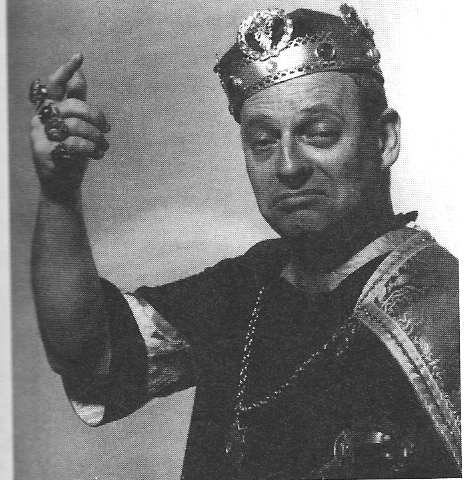
Hal Murray at KQV Within a few weeks, I had also hired Don Shaefer and Charlie Peterson from KALL-Salt Lake City, both excellent program minds and production talents that contributed to making my job easier. Don would return to KSL in Salt Lake City and Peterson would become program director of KDKA as the years would pass. Tom Lee joined us as did Al Julius, Hal Buckner (Johnny Mitchell), Steve Rizen and Dex Allen who came from Denver radio. Al would become a major Pittsburgh radio & TV personality in the years ahead. Steve added radio in Miami to his credits before becoming a Houston educator. Dex Allen stopped off in Seattle before returning to his native southern California and a major group owner of radio. Jim Quinn was brought in from WING-Dayton and is still on the air in Pittsburgh as a very successful talk show host. Chuck Brinkman moved on to KLUV-Dallas where his programming expertise kept that station in the top five rated stations there for many, many years. Within weeks of my arrival, I discovered the sales manager, a big loud former RAF pilot from England would be a major hurdle in challenging my programming decisions. Calling me into his office, he insisted "if you know what's good for you, you'll back off" some of the controls I had instituted. Prior to my arrival, he had exercised his "right as management" to not only dictate what music was programmed but how often it was to be heard. Requests and dedications aimed at his clients, were commonly heard on KQV. "I've seen you programming guys come and go", he said. "You'll be next to join the parade unless you know what's good for you". Despite my explanation of how important it was for the program director to be totally in charge of programming, he warned, "you either do it my way or you'll find your bloody self back in the hick town of Denver boy". Expressing my alarm to John Gibbs brought no solution to the problem, he suggested I "learn to solve that problem". A few more weeks would pass before I made the situation known to my WABC programming counterpart Rick Sklar. "Hal Neal needs to know about this", he said. Within just a few hours, John Gibbs entered my office to with the look of surprise on his face to announce "my boss, Hal Neal, has requested your presence tomorrow in New York". I had an idea why...but Mr. Gibbs didn't ask. A day later I was sitting in front of Hal Neal, who with a red face questioned me about the "interference you are having in Pittsburgh?" As I detailed the problem, he stood offering me his hand to shake and said, "go on back to Pittsburgh, say nothing to anybody....I'll be there tomorrow". I was glad my flight home didn't return me to Pittsburgh until almost midnight. Gibbs had earlier telephoned twice, obviously interested to learn why his boss had requested to see me. Arriving at the station just before 9 am, I could see the door leading to John Gibb's office was closed. Unusual, I thought, since it was always open and Mr. Gibbs was there most mornings by 8 am. The answer came an hour later when Hal Neal entered my office to ask, "is their someone you could work with already in the sales department", he asked. 'Yes, I think John Tenaglia and I can get along", I replied. Without saying another word, Neal turned and returned to Gibb's office. Later that day it was announced by memo circulated to each department that their had been a change in the sales manager's position....John Tenaglia was now sales manager. In stopping by my office later that day, Gibbs said with a smile, "I see you learned how to take care of your problem". John Tenaglia became a long time friend but this lessen would again be valuable upon my arrival at WLS a few years later. All other radio stations in the market had call letters starting with a "W", KQV and KDKA were the only "K" stations in the market. I searched for ways to give KQV an identity of its own. Wanting to make our dial position stand out ...I began a campaign aimed at making KQV-"Audio 14" and "Groovy-QV" foremost in the minds of listeners. It worked and KQV began to have an image of being the "hot station" in town as we brought in scores of the nations top recording artists. On an almost daily basis a recording star would visit KQV with the station a major force in providing exposure for new artists. On one such occasion, the legendary George Goldner, who I had met earlier in Denver, arrived to promote a record he said he could not get anyone interested in programming .... "I think its a hit Johnny, but no one is interested in playing anything but the damn Beatles", he said. I agreed and immediately made "Chapel of Love" by the Dixie Cups KQV's "Pick of the week". Within days it was #1 in Pittsburgh and duplicated the feat across the nation. George soon returned with another release he was having no luck in promoting, "this is a very unusual record", he said. I could not believe George didn't already have a hit with "Remember, Walkin' in the Sand" by another unknown group called "The Shangri-Las". It was another ""Pick Hit" that would break in Pittsburgh before climbing into the nations top five nationally, it was followed with "Leader of the Pack" that topped the national Hit Parade. Before it was over, KQV had broken five big hits nationally for George's Red Bird records. 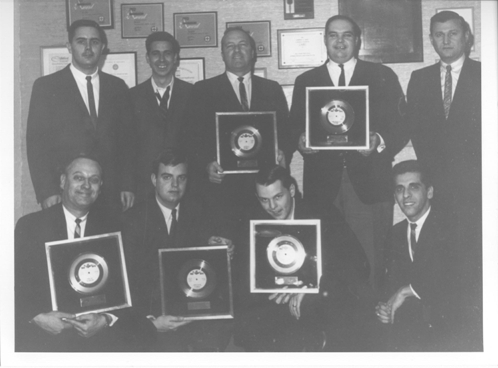
Front row, Hal Murray, Chuck Brinkman, Dex Allen, Jack Hakim Back row, John Rook, Nick Cenci, Dave Scott, Steve Rizen, George Goldner Goldner was delighted, returning around Christmas time to present the KQVips with gold records for "making my year". "Its one of the few times it didn't cost me", he said. "You're something else Rook". It began my reputation of never accepting a bribe...or payola to play a record. Pittsburgh was graced with an abundance of talented local musicians and singers, the area was loaded with music history. Among them the highly acclaimed composers and orchestra leaders Billy May and Henry Mancini, jazz great Erroll Garner, George Benson, Perry Como, Bobby Vinton, Lou Christie, Skyliners, Del Vikings, Vogues and dozens of others were natives of the area. Bobby Vinton would come by the station to go through our "oldies" to find songs he could give new life too. Years later I would be his guest at his Pacific Palisades home at Santa Monica. Hot from Hit Parade toppers "Two Faces Have I" and "The Gypsy Cried", Lou Christie sat in my office until I promised to give his "Lightin' Strikes" some air play. He insisted it would be a #1 hit, I said perhaps a top 10 hit ... Lou was right it hit number one nationally in late 1965. Nick Cenci camped out at KQV til' his "You're The One" by the Vogues got added to the playlist. The group that was named after the old Vogue Ballroom in Pittsburgh followed it up with "Five O'clock World". Started by KQV, both would top the national Hit Parade as the group would continue with two more giant hits produced by my good friend Dick Glasser, "Turn Around Look At Me" and "My Special Angel". Remembering earlier Glen Campbell and Bobby Helms hits, I suggested "Turn Around" and "Angel". The Vogues visited the Hit Parade a total of 14 times. Just some of the memories of hits that got started by KQV. Record promoters would line up a dozen deep in the lobby of the station for a chance to be exposed on a station known for "breaking the hits" and creating music excitement for Pittsburghers. KQV's "Shower of Stars" presented the Beach Boys, Sonny & Cher, Bobby Goldsboro, Vic Dana, Bobby Rydell, Dion & the Bellmonts, Jimmy Jones, the Four Seasons, Tom Jones, the Fleetwoods, Bobby Vee, Vic Dana, Peter & Gordon, the Hollies, the Who, Herman's Hermits, the Supremes, the Four Tops, Johnny Rivers, Jan & Dean and dozens of other big hit acts. Of course, KQV also presented the Rolling Stones and the Beatles As a young lad, Vic Dana started out as a dancer, was motivated by Sammy Davis Jr. and by 1961 as a singer, hit with the big Christmas hit of that year, "Little Altar Boy". Adding over a ten year period, "I Will", "More", "Shangri-La", "Red Roses for a Blue Lady", "I Love You Drops", "If I Never Knew Your Name" and "Red, Red Wine". A guest DJ on KQV, Vic was one of my good friends. Bringing sons Justin and Jason into the world, Vic and Cindy often invited me into their home in the Hollywood hills. Lost track of him in the early 90's. ... call pal. 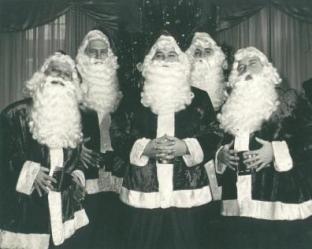
KQVip Santa's Hal Murray, Tom Lee, Steve Rizen, Chuck Brinkman, Dave Scott In my second year at KQV, one of those spring floods at the mouth of the Ohio River would threaten Pittsburgh's downtown area with our KQV news department unable to give "on the scene" coverage I had hoped for. I telephoned Rick Sklar at WABC for any suggestions he may have. He said something about an amphibious car he had read about, "it's made in France". A lot of good that would do me, I thought dismissing Rick's suggestion. Several months later in the middle of the summer I was called up to the receptionist desk in the main lobby of KQV and asked to sign a company requisition for the new amphibious car that had arrived and was being delivered. Thus, the car/boat that could go anywhere on land or water was named "the KQVehicle", replacing a mobile studio that was often used to attract advertisers that requested a "remote" broadcast. I refused to allow "remotes" and instead insisted all attention be given to programming, not advertisers. I appreciated the advise of my old friend Ken Palmer, owner of top rated KIMN in Denver .... "great programming attracts advertisers". With my home on the banks of the Monongahela River, rather than park the KQVehicle in public parking near the station I often used and had the unit at my disposal for traveling to and from work. I'd take the city streets to the edge of the riverbank, then drive right out into the water and head home without facing the heavy automobile traffic on land. It cut my travel time in half and often astonished those traveling the crowded highway that ran along side the river. Many would come to a stop along side the road to marvel at the automobile/boat that moved through the water. It was another great way of promoting KQV News ... even KDKA with all the resources of Westinghouse couldn't match us. Live direct broadcast was still in its infancy but KQV had "two way" radio's ... thanks to ABC having provided them first for our coverage of the Beatles in Pittsburgh. 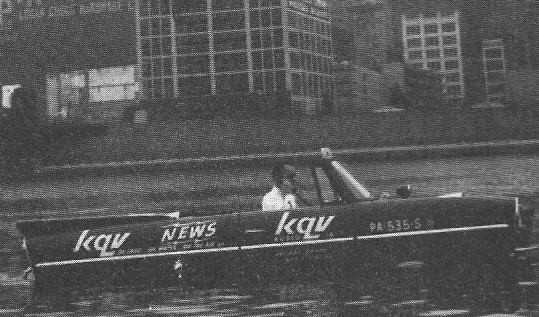
(This is just an excerpt from Passing Thru) All
Content on this Web Page © 2006 John H. Rook
|